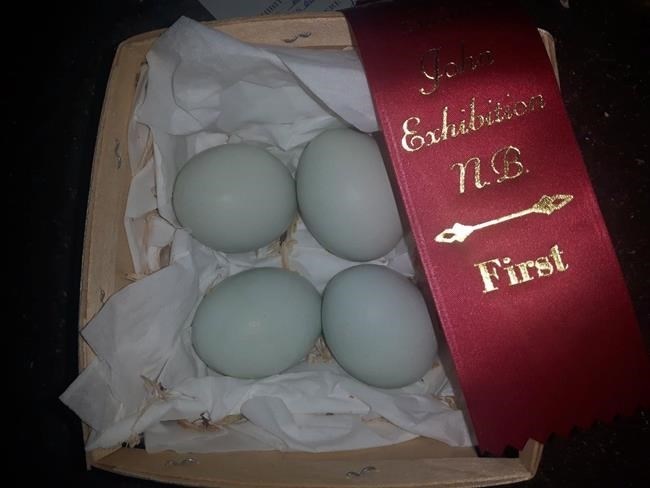
A box of Kyrie Ann Neves's prize-winning blue chicken eggs are shown in this undated handout photo. Kyrie Ann Neves's chicken eggs may look a little different than the ones you might buy at the supermarket. That's because her eggs come in pastel shades of blue, green, pink and yellow: all without the help of food colouring.
Image Credit: THE CANADIAN PRESS/HO - Kyrie Ann Neves
September 02, 2018 - 9:30 AM
WELSFORD, N.B. - Kyrie Ann Neves's chicken eggs may look a little different from the ones you might buy at the supermarket.
That's because her eggs come in pastel shades of blue, green, pink and yellow: all without the help of food colouring.
Neves and her mother have been operating a farm out of Welsford, N.B., for the last two years with around 300 chickens — about a third of which are "Easter Eggers," a name given to hens that lay colourful eggs.
"I saw there was a niche here for some eggs. Everyone has white, everyone has brown, but there were no coloured eggs," she said, adding that the colourful eggs have been a big seller at the farmers markets where she peddles them to incredulous customers.
"It's been a hit. I literally cannot have enough blue, green, pink, or yellow eggs."
The "Easter Eggers" are the result of carefully crossbreeding Ameraucanas, a type of blue-egg-laying chicken, with Araucanas, a type of Chilean chicken that lays bluish-green eggs.
The resulting hybrid can produce eggs in "a kaleidoscope of colours," said Neves, with some even laying pink or yellow eggs, which are not laid by either of the original birds.
She said the colours of the eggs are not purely aesthetic and there is an evolutionary advantage for the Araucanas to lay their blue-green eggs.
"Hens from the northern part of the hemisphere do, typically, lay white or brown eggs as camouflage. But birds south of the equator lay a variety of colours as a better way to hide their eggs," she said.
She said that a bird hatched from a coloured egg is more likely to lay eggs in that colour, and that you can sometimes tell by colouring around a baby bird's ear what colour they're going to lay — but it's hard to tell with certainty.
"You don't actually know what colour they're going to lay until they start laying almost a year later," she said.
She hopes to breed more birds that lay yellow eggs, since she only has one bird that lays them.
Baskets of her green and blue eggs won Neves two ribbons at the Saint John Exhibition late last month.
Judy Martin, the general manager of the Exhibition Association, said she didn't believe the eggs were real when she first saw them.
"I bought a dozen to bring home and see what my 16-year-old would say," she said. "They were quite the conversation piece."
She added that the exhibition, which previously only had contest categories for brown and white eggs, opened a new category this year for coloured eggs.
Barry McPhee, a judge at the exhibition, said competitions like the one last Tuesday can help raise awareness for eggs that might not be a standard white or brown colour.
"For most people, (eggs) are involved in their day somewhere, whether it's eggs for breakfast, or eggs florentine at night," he said.
"People are capitalizing on that, and if you go to the farmers market, people are selling olive and blue eggs. That's quite common now."
For Neves, the demand for her tinted eggs isn't the only thing driving her farm, which also houses two horses and five dogs: she said she loves what she does.
She first bought the farm so she and her mother could have the chance to work from home and care for her disabled brother, and since then, she said things have gone swimmingly.
"Family doesn't always do business well together, but we get along famously. We're friends, and we're family, and we really have a passion for what we're doing," she said.
"You have to have passion in what you do, and that makes you good at what you do. It doesn't mean that you have to be perfect, you just have to love what you do. And I love it."
— By Alex Cooke in Halifax
News from © iNFOnews, 2018